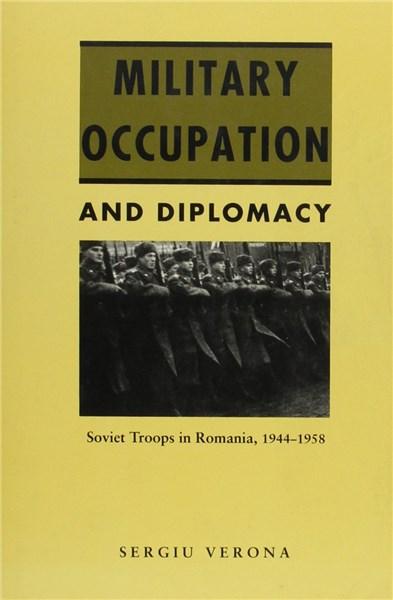Military Occupation and Diplomacy: Soviet Troops in Romania, 1944-1958 | Sergiu Verona

Detalii Military Occupation and Diplomacy: Soviet
carturesti.ro
301 Lei
Carte straina
Duke University Press
Military Occupation and Diplomacy: Soviet - Disponibil la carturesti.ro
Pe YEO găsești Military Occupation and Diplomacy: Soviet de la Duke University Press, în categoria Carte straina.
Indiferent de nevoile tale, Military Occupation and Diplomacy: Soviet Troops in Romania, 1944-1958 | Sergiu Verona din categoria Carte straina îți poate aduce un echilibru perfect între calitate și preț, cu avantaje practice și moderne.
Caracteristici și Avantaje ale produsului Military Occupation and Diplomacy: Soviet
- Departament: gaming-carti-birotica
- Ideal pentru pasionații de jocuri, birotică și distracție online.
Preț: 301 Lei
Caracteristicile produsului Military Occupation and Diplomacy: Soviet
- Brand: Duke University Press
- Categoria: Carte straina
- Magazin: carturesti.ro
- Ultima actualizare: 27-10-2025 01:24:43
Comandă Military Occupation and Diplomacy: Soviet Online, Simplu și Rapid
Prin intermediul platformei YEO, poți comanda Military Occupation and Diplomacy: Soviet de la carturesti.ro rapid și în siguranță. Bucură-te de o experiență de cumpărături online optimizată și descoperă cele mai bune oferte actualizate constant.
Descriere magazin:
In 1958, after 14 years of military occupation, Khrushchev withdrew the USSR\'s troops from Romania as part of a political move intended to encourage the withdrawal of Western military forces from Europe. In analyzing this crucial historical episode, Sergiu Verona\'s study illustrates the dynamics of Soviet military presence in Romania and provides a framework for understanding Soviet security policy, then and now, as well as the interaction between Soviet military objectives and diplomacy. Drawing on recently declassified archival material in the USA and the UK, the author considers Khrushchev\'s reversal of Stalinist expansionism by examining the motivation, function and operation of the initial occupation of Romania; Soviet diplomacy and its perception by the USA and other Western powers; the process by which Khrushchev decided to withdraw Soviet troops from that country, and the impact of this decision on Soviet policy. Verona extends his analysis to the present, providing comparisons between Khrushchev\'s and Gorbachev\'s approaches to Eastern Europe, noting that similarities exist not only in domestic policies but in the realm of foreign policy as well.

Produse asemănătoare

Military Occupation and Diplomacy: Soviet Troops in Romania, 1944-1958 | Sergiu Verona
![]() carturesti.ro
carturesti.ro
Actualizat in 27/10/2025
301 Lei

Resisting Disappearance: Military Occupation and Women\'s Activism in Kashmir, Paperback/Ather Zia
![]() elefant.ro
elefant.ro
Actualizat in 20/10/2025
187.99 Lei
Produse marca Duke University Press

Passionate Work. Endurance after the Good Life, Paperback/Renyi Hong
![]() elefant.ro
elefant.ro
Actualizat in 28/10/2025
165.99 Lei

Movement and the Ordering of Freedom. On Liberal Governances of Mobility, Paperback/Hagar Kotef
![]() elefant.ro
elefant.ro
Actualizat in 28/10/2025
194.99 Lei

Indonesian Notebook. A Sourcebook on Richard Wright and the Bandung Conference, Paperback/***
![]() elefant.ro
elefant.ro
Actualizat in 28/10/2025
173.99 Lei

Multisituated. Ethnography as Diasporic Praxis, Paperback/Kaushik Sunder Rajan
![]() elefant.ro
elefant.ro
Actualizat in 28/10/2025
173.99 Lei

Since Time Immemorial. Native Custom and Law in Colonial Mexico, Paperback/Yanna Yannakakis
![]() elefant.ro
elefant.ro
Actualizat in 28/10/2025
180.99 Lei
